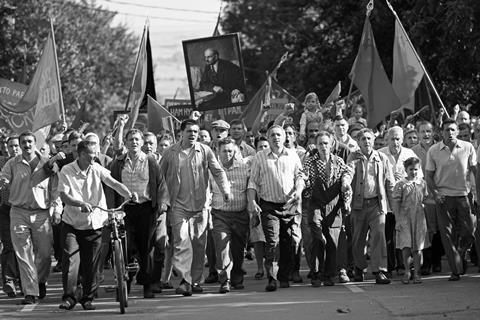The Novocherkassk Massacre is seen through the eyes of a single mother

Dir. Andrei Konchalovsky. Russia. 2020. 120 mins.
Now in his 80s, Andrei Konchalovsky, the veteran Russian director – and briefly, Hollywood notable - has made one of his most Russian, and most accomplished, latter-day films with fact-based drama Dear Comrades!. Following last year’s Italian co-production Sin, about Michelangelo, Konchalovsky returns to home territory and more recent history, recounting a brutal episode in the USSR’s Khrushchev era, the so-called ‘Novocherkassk Massacre’ of June 1962.
Marked by a certain sober formality, the visual style is elegant but never over-aesthetic
This meticulous, serious-minded account reconstructs the event from the point of view of one woman, compellingly played by the director’s wife and regular star Julia Vysotskaya. Carried off with evocative precision and a cannily underplayed emotional tug, the film is a significant advance on 2015’s dubiously glossy wartime drama Paradise, Konchalovsky’s last Venice competition entry, which won him Silver Lion for Best Director. Dear Comrades! is likely to attract serious attention following its Lido premiere, especially following a spate of recent acclaimed studies of the Soviet past (Beanpole, Leto, Dovlatov).
Set over three days, the drama – shot in Academy ratio, in black and white – focuses on Lyudmila, or Lyuda (Vysotskaya), a privileged Communist Party official in Novocherkassk in Southern Russia’s Don region (the actress’s own home town). Single mother Lyuda is first seen grumpily discussing rising prices with her lover, also an official, although both know that discontent is to be aired only behind closed doors; besides, Lyuda is devoted to the Party, but hankers for the days of the Stalin regime. Later that day, it emerges that a strike is happening at the local electric locomotive factory, where Lyuda’s teenage daughter Sveta (Julia Burova) is a worker. Soon, a crowd of protesting workers leaves Lyuda and her fellow apparatchiks trapped inside the factory, and obliged to leave through the building’s labyrinthine bowels.
The next day, when several thousand workers from the region join the protest, a KGB sniper opens fire, sparking slaughter for which the Army gets the blame (one of the film’s revelations is just how much these two entities were at odds with each other). As bodies pile up, the authorities move to conceal the chaos by means that include organising a music festival as a propaganda cover-up, and making locals sign non-disclosure agreements. “What must I not disclose?” asks a hospital nurse. “Nothing,” she is told. “Nothing happened.” Meanwhile, Lyuda desperately searches for the missing Sveta, with help from Viktor (Andrei Gusev), a KGB captain.
The script, by Konchalovsky and Elena Kiseleva (co-writer on his recent films), adeptly carries off the classic but risky tactic of channelling historical events though one fictional character’s experience. Lyuda makes such a strong narrative focus partly because she embodies the contradictions of the early ’60s Soviet Union, still traumatised by the denunciation, in the 1956 Communist Party Congress, of the abuses of the Stalin era. Here, much discussion is heard of the idea of new freedoms, notably the constitutional right to protest, but events show what they really meant in practice. Lyuda herself is a hardliner who calls for draconian treatment of the protesters, before realising what this means for her family.
Some of the contradictions aired are compelling – like the way that KGB man Viktor is himself treated with contemptuous suspicion by Army personnel. Others involve more of a dramatic leap: like the fact that Viktor turns out a sympathetic stand-up guy, having earlier been seen scanning crowd photos for people whose facial expressions supposedly mark them out as ‘instigators’ to be targeted. A particularly compelling figure is Lyuda’s elderly father (Sergei Erlish), who reaches for his old-style military uniform and religious icon in time of crisis, and who has plenty to tell Lyuda about state abuses in the past.
The script occasionally makes its points about the period a little too flatly, as when someone says wistfully of Stalin’s time, “It all made sense then – who’s an enemy and who’s one of ours.” But despite such clunky touches, the film is altogether involving, with a pace coolly sustained over the drama’s three-day stretch. The stylistic execution is cannily detached, with Andrei Naidenov’s black and white photography – its clean, steely tone recalling the looks of both Roma and Cold War - maximising the southern summer light. Marked by a certain sober formality, the visual style is elegant but never over-aesthetic, astutely keeping the bloodshed itself at a distance (a key moment shows the carnage through a window, its sound muted by a lyrical song on the radio).
The drama keeps a well-calibrated balance between political horror, the matter-of-fact texture of everyday life, and the rhetoric that keeps the Soviet machinery oiled – and that Lyuda is struggling to see through. The film’s magnetic centre is a strong performance from Vysotskaya, working from a base line of initial testiness to rising anxiety and terror in face of the oppression that she realises she has been enabling. The final, oddly romanticised scene strikes an incongruous note, seeming to mix a faint pastiche of Soviet Socialist Realism with a touch of Chekhov – but then, as he has adapted the playwright on stage and screen, that is very much in Konchalovsky’s territory.
Production company: Andrei Konchalovsky
International sales: Films Boutique, contact@filmsboutique.com
Producers: Alisher Usmanov, Andrei Konchalovsky
Screenplay: Andrei Konchalovsky, Elena Kiseleva
Cinematography: Andrei Naidenov
Editors: Sergei Taraskin, Karolina Maciejewska
Production design: Irina Ochina
Main cast: Julia Vysotskaya, Vladislav Komarov, Andrei Gusev, Julia Burova, Sergei Erlish
























